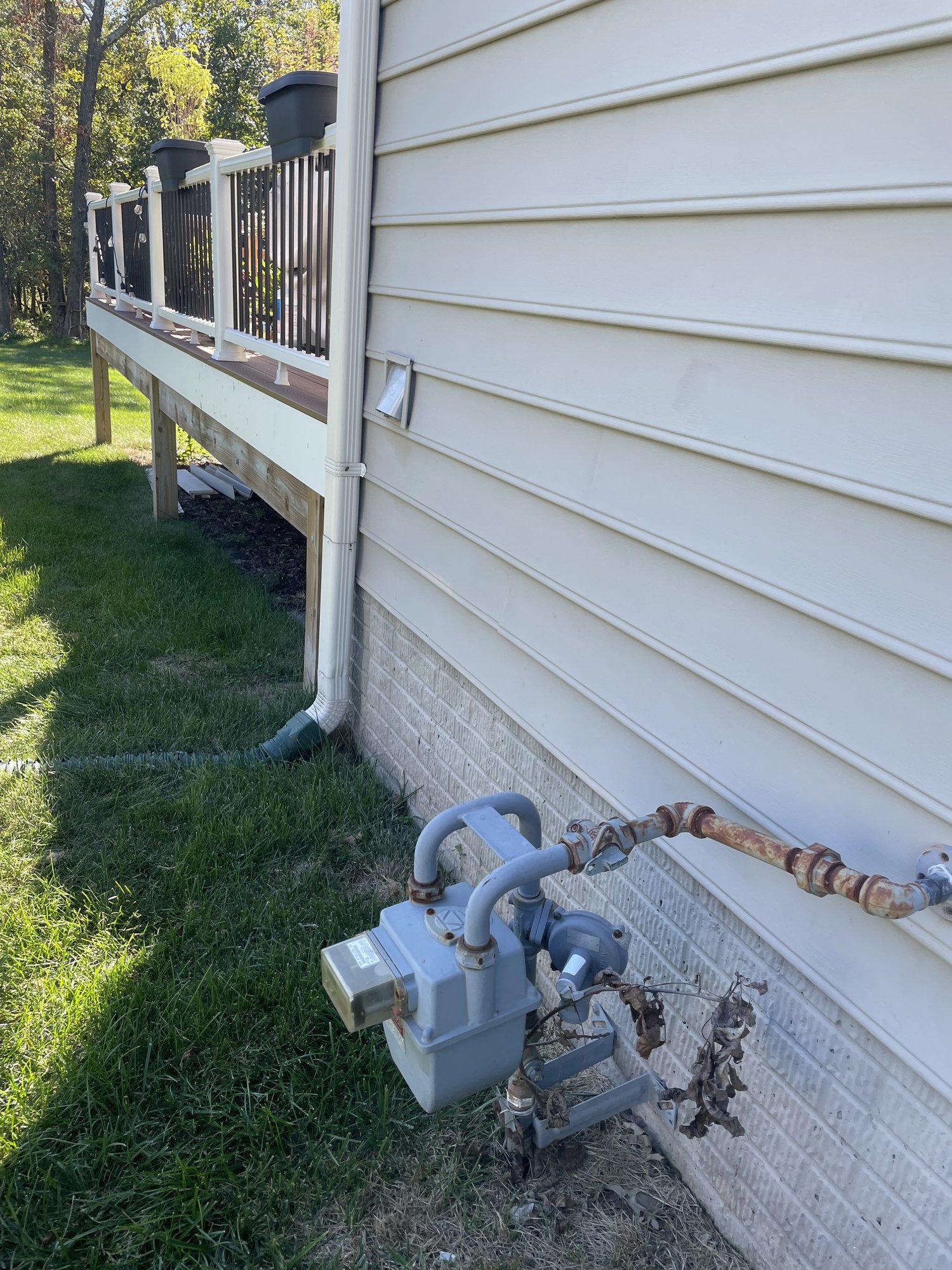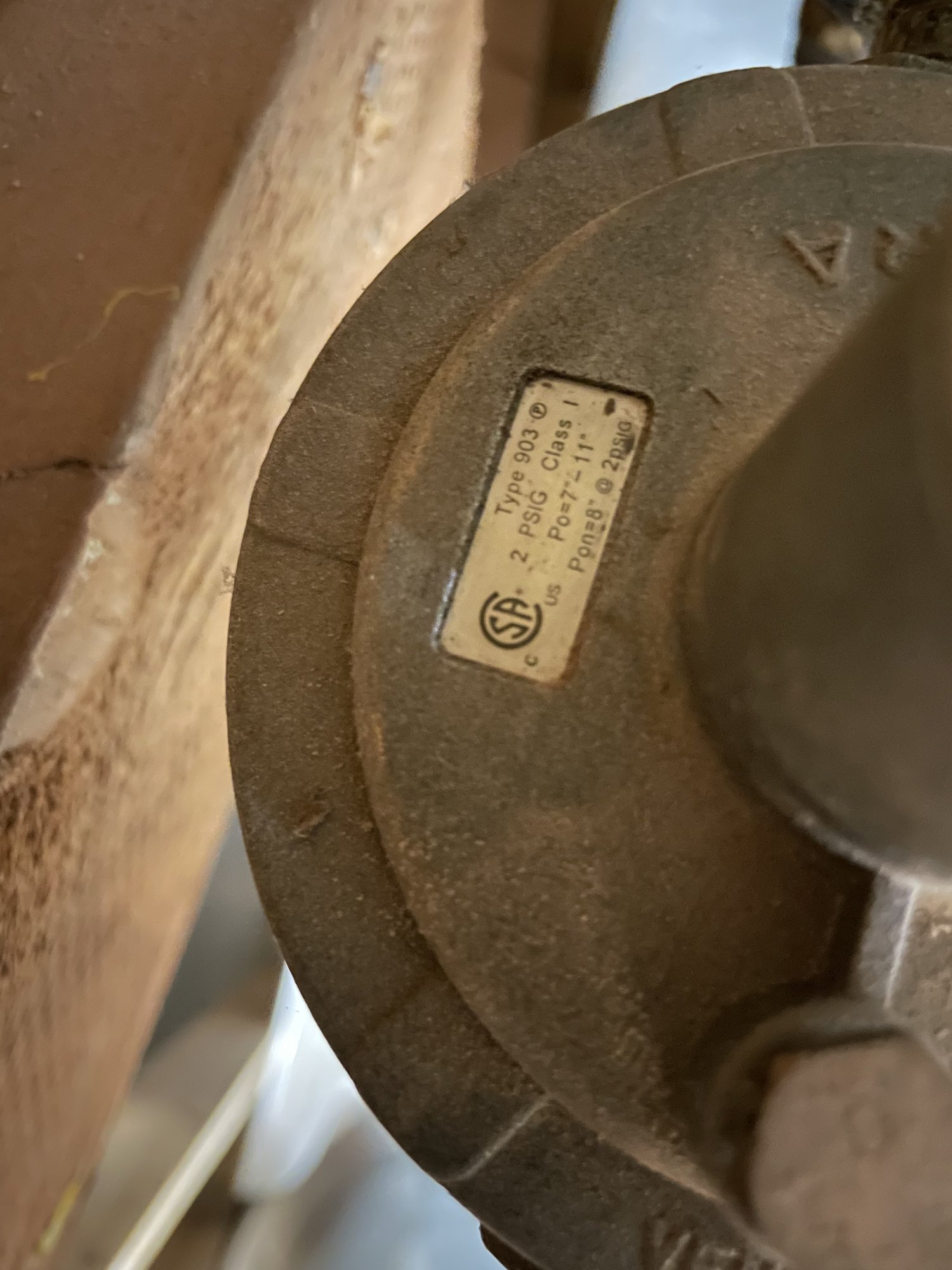Welcome! Here are the website rules, as well as some tips for using this forum.
Need to contact us? Visit https://heatinghelp.com/contact-us/.
Click here to Find a Contractor in your area.
If our community has helped you, please consider making a contribution to support this website. Thanks!
Gas pipe size and regulator
Options
AndyOye
Member Posts: 4



Hi, we are looking to run a gas line from meter to our deck to connect gas grill (90k btu), oven (9k btu) and a fire pit (125k btu).
we have 2 contractors came in and one said we don’t need a regulator and other said we need it.
The distance between gas meter and
Grill = 12 ft
oven 15 ft
fiirepit 28 ft
They say we have 2PSI system. Last pic is inside regulator connected to a manifold.
Grill = 12 ft
oven 15 ft
fiirepit 28 ft
They say we have 2PSI system. Last pic is inside regulator connected to a manifold.
What pipe size we need and what type/capacity regulator we need.
Thanks
1
Comments
-
If I am getting you correctly the gas comes in from the street goes through the outside regulator (under the meter) which drops the pressure to 2 psi the gas goes in the house and then you have another regulator (the #903) which drops the gas to 7"wc to 11" wc outlet pressure.
If that's the way it is the answer is
It depends.
If you connect the gas at the meter outside and run it to the deck you will need an additional regulator to lower the 2psi gas pressure going to the grill. Since your adding a bit of load I would come off the 2psi line (if your local inspector allows).
If you get the gas from inside the house you will be coming off a low pressure line and need no other regulator except the one that will be built into the gas grill.
Assuming you go with the first option (2psi) you need
1 gas reg for 2psi inlet with 10" wc outlet pressure that will carry 224 cubic ft of gas
(I can't pick the reg because their are too many local codes. In Mass where I am all high pressure (2psi) regulators have to be good for 100psi. Other localities differ widely.
As far as pipe size goes. I would go 3/4" into the new regulator 2psi gas
1" main out of the reg to the first appliance (Grill) 3/4 branch to grill
3/4 main from the grill to the 2d appliance (oven) 1/2" branch to oven
3/4" to fire pit
The above is subject to any local rules. Here in Ma we can't have 2psi in the house. I don't believe Connecticut does either
Your "contractors" should be able to figure this out better than I can, they know the local rules
0 -
The outside meter has a tag claiming 6-8 inches water column ("6-8 IWC" on the tag). It's possible that the spring has been replaced with a 2# spring, but IIRC the tag is supposed to be defaced if that happens. In any case, it's only a matter of minutes to stick a manometer on it to prove the outlet pressure.2
-
The #903 reg is inside the house.I would go with option 1.Below looks good based on your recommendation?
 Can you please paste a link for a 2 psi regulator? Can I use a #903 outside too?Thanks much0
Can you please paste a link for a 2 psi regulator? Can I use a #903 outside too?Thanks much0 -
You can't assume anything, you need to put a manometer on it and measure the pressure.
Until we know exactly what's coming out of that meter we cannot help you.
6-8" is very different than 2 PSI which is 56".
Single pipe 392sqft system with an EG-40 rated for 325sqft and it's silent and balanced at all times.
0 -
The 2 PSIG rating on the inside regulator is the maximum inlet pressure. It claims a 7-11 inch spring, preset to give 8" with an inlet of 2 PSIG. Again, it needs to be verified.
Did any of your plumbers stick a Kuhlman (or other manometer) gauge on it? If they didn't, they're just guessing—or playing the odds.
0 -
@AndyOye
After looking this over again. I don't think you have a 2 psi service. The service regulator "B42R" only has " of WC output according to the tag and that's on the line side of the meter
Having that regulator and the one in the house is confusing.
Either have someone put gauges on their and find out what you have or get the gas utility over their. Otherwise it's a guess
If your adding 124,000 to an existing service you going to have to get the utility involved to see if they can even supply the gas + your existing load which we don't know & if the meter is large enough. We don't know the existing load2 -
 This is what one contract said:
This is what one contract said:
“The flange on house indicates that the inside is run on CSST gas pipe which is primarily used on 2 psi (High pressure) systems but the label on the regulator is 6 to 8 IWC (low pressure). Can you send me a picture of how the gas line is run on the inside of the house? Does it go to a manifold and the go to different appliances or does it run to one or two appliances just on the other side of the wall?” Then I sent him picture of inside manifold and regulator . he said: “you have a 2 psi system so enough gas to do whatever you want”
0 -
the meter itself should say what it is set up to measure as well, possibly a label on the index("dial") rather than the meter body.0
-
The markings on the regulator outside look like a low pressure system, the TracPipe & regulator inside look like a medium pressure system. If it is indeed a medium pressure system, I'd tap into it on the high side & regulate down either with a single manifold closer to the points of use or appliance regulators.
Probably still want to do a load calc to see if the service will support the added flow, IIRC it's substantial.
Protip: Use the gas sizing tables from the Olden Days when the pipes were sized for least drop, not the modern, greatest drop, method. CSST will always need to be larger than steel pipe.
0 -
@AndyOye
Guessing doesn't work. You have a drip leg on the manifold inlet where the pressure can be checked upstream of the indoor regulator
and a plug on the end of the manifold to check the regulator outlet pressure.
In addition with the 125,000 your adding you don't know if the meter is large enough for that load.
You need to call the gas utility2 -
Don't attempt to be a DIYer on this project. Lives are at stake here AND if something goes wrong there may be legal charges against you and anyone unlicensed performing the work. Also, your insurance company may elect not to pay damages should badness occur based in the aforesaid.
Contact a licensed gas fitter for this project. They will size the current load and calculate added btu's for correct pipe sizing. Also, if the CSST is not properly bonded, they can coordinate correcting it with an electrician to tie into the service panel.
Just trying to help.1 -
Another guy said today that he will use a manifold and run 3 separate lines for each appliance0
Categories
- All Categories
- 87.5K THE MAIN WALL
- 3.3K A-C, Heat Pumps & Refrigeration
- 61 Biomass
- 430 Carbon Monoxide Awareness
- 122 Chimneys & Flues
- 2.1K Domestic Hot Water
- 5.9K Gas Heating
- 118 Geothermal
- 170 Indoor-Air Quality
- 3.8K Oil Heating
- 78 Pipe Deterioration
- 1K Plumbing
- 6.6K Radiant Heating
- 395 Solar
- 15.9K Strictly Steam
- 3.5K Thermostats and Controls
- 57 Water Quality
- 51 Industry Classes
- 51 Job Opportunities
- 18 Recall Announcements

